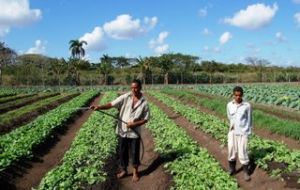MercoPress. South Atlantic News Agency
Cuba is desperate to promote agriculture.
 Highly dependent on food imports, Cuba is desperate to promote agriculture.
Highly dependent on food imports, Cuba is desperate to promote agriculture. Measures to promote the “attachment to farms” and discourage the exodus of peasants to the cities thus helping Cuba achieve self sufficiency in food production, was demanded in Sunday’s edition of the official newspaper from the Union of Communist Youths, Juventud Rebelde.
Cuban government plans to boost food production have failed among other reasons because of the scarce willingness of young people to remain in the fields and farms following their peasant parents traditions, because “toiling the land is tough”, points out the daily.
To combat this exodus Juventud Rebelde has suggested the Havana government implement measures to promote attachment to the land, beginning in rural villages, so that young people remain to work and “won’t endanger food production”.
In spite of over half a century of the same regime Cuba is highly dependent on foreign food imports, over two billion US dollars annually, and official data show that during the first quarter of this year, food imports represented 78% of total overseas purchases.
According to the latest demographic data released, Cuba only has 19.964 youths as private farmers or members of farm cooperatives, which represents 6% of all of the island’s peasants’ work force.
The National Statistics Office shows that out of a population of 11.2 million, 8.4 million Cubans live in cities and urban locations and 2.7 million in rural areas. But the rural population also includes young people currently studying or training for non agriculture professions or trades.
Juventud Rebelde describes the deficit of man power in farms as “very serious”, although lately there has been a return of peasants’ children to farm cooperatives to rejoin their families.
The return has been promoted by a new bill from the administration of President Raul Castro which grants the use of government idle land in all the country, to individuals which take them over in the framework of a private property system.
This incentive makes the individual farmer more interested in exploiting his “piece of land” with increased production, better yields and far above those obtained at the cooperatives or collective farms system.
Besides granting idle land the government also has a program to facilitate tools, equipments and fiscal incentives to further boost production.




Top Comments
Disclaimer & comment rulesCommenting for this story is now closed.
If you have a Facebook account, become a fan and comment on our Facebook Page!